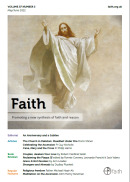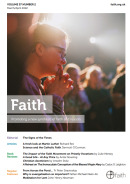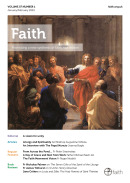Featured
Time to Pray
Britain became familiar with a new vocabulary in 2020: Covid, lockdown, self-isolating. All bleak words, and the bleakness has been increased by their use in the sort of formal announcement that has become the background noise of our lives, and thus blurs into nothingness,mergingwithotherslogans:wearaface-mask,staysafe,savetheNHS,please take your luggage with you when you leave the train…
Fratelli Tutti: In Search of a New Vision of Fraternal Love

Monsignor Patrick Burke considers Fratelli Tutti (Italian for “Brothers All”), the latest publication from the pen of Pope Francis.
Archbishop John Wilson talks to FAITH magazine
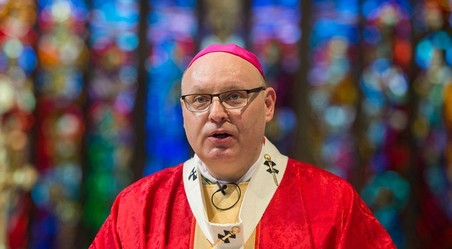
Joanna Bogle talks to Archbishop John Wilson about his first year as Archbishop of Southwark.
A Christian View of Relationships and Sex Education

Bishop Michael Nazir-Ali sets out what is happening in the Department of Education’s plans for Relationships and Sex Education
Roger Penrose, Black Holes and the Human Mind

Gregory Farrelly looks at the religious implications of the work of Roger Penrose.
A Saint for Shrewsbury?
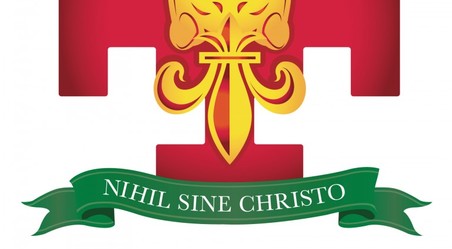
Bishop Mark Davies has urged that Elizabeth Prout be considered as a candidate for canonisation.
Holloway on... Holiness in the Twenty-First Century
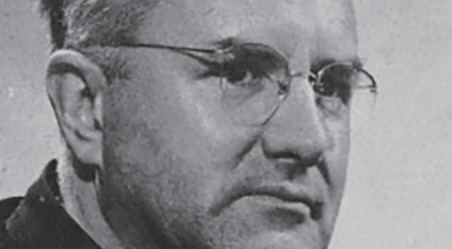
Writing in 1986, Fr. Holloway asked which version of Christianity would be needed in the coming new century.
After Francis
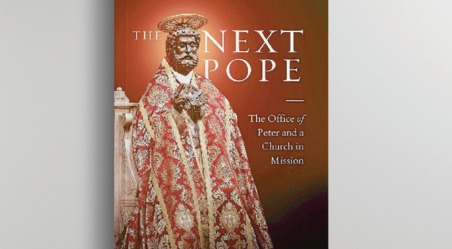
The Next Pope, the Office of Peter and a Church in Mission by George Weigel (Ignatius Press 141pp, £16.50 Hardback, £12.53 Kindle). Reviewed by Bishop Peter J. Elliott
Our Lord the Beautiful
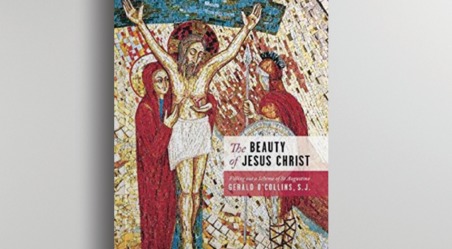
The Beauty of Jesus Christ by Gerald O’Collins S.J (Oxford University Press 176pp, £25.00). Reviewed by Scott Coleman
A Vade-mecum for Priests
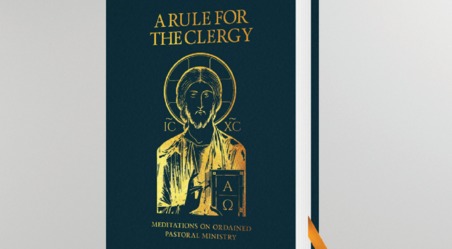
A Rule for the Clergy - Meditations on Ordained Pastoral Ministry by Fr Gerard Bogan (Catholic Truth Society 128pp £12.95) Reviewed by Fr Peter Edwards
-
Time to Pray
Britain became familiar with a new vocabulary in 2020: Covid, lockdown, self-isolating. All bleak words, and the bleakness has been increased by their use in the sort of formal announcement that has become the background noise of our lives, and thus blurs into nothingness, merging with other slogans:wear a face-mask,stay safe, save the NHS, please take your luggage with you when you leave the train…
Does the Church have something to say about all of this? Yes – and, when we are allowed, something to sing about, too. We have a message of hope, a message that can renew society and help us all to work with realism and courage as we face the problems and challenges that 2021 is going to bring.
God is the author of life, the creator of all things, and came into this world that he had created, sharing fully our human nature, living and working among us, and in dying and rising from the dead, he fully explained to us the purpose of it all. We have a message to proclaim that should soar above the noise and offer hope and spiritual sustenance in this and every age.
But it has not been easy to proclaim the message over the past months. The Church in her public sense in Britain was effectively silenced.
No public Masses, no family weddings or baptisms, minimal funerals. No normal parish life with no Rosary groups or confirMation classes or choir practices or baptism preparation. No open events at Walsingham in the summer with large crowds making their way, singing and praying, down the Holy Mile. No great gatherings of families and young people at “Celebrate” and “New Dawn” and the annual Youth 2000 pilgrimage. No summer retreats and conferences, from Bosco youth camps to the Faith Summer Session. No parish First Communions with children in traditional attire, no processions with the Blessed Sacrament through the streets, no open-air Masses. Even the mundane things – the parish fetes, and picnics, and the end-of-term Masses, were missing.
In the strange and lonely lockdown days, when churches and schools and univer-sities and more were all closed, and the internet dominated our lives, conspiracy theories flourished. Some have, Deo gratias, slithered away, others have not.
But it has not been easy to proclaim the message over the past months. The Church in her public sense in Britain was effectively silenced.
No public Masses, no family weddings or baptisms, minimal funerals. No normal parish life with no Rosary groups or confir-mation classes or choir practices or baptism preparation. No open events at Walsin-gham in the summer with large crowds making their way, singing and praying, down the Holy Mile. No great gatherings of families and young people at “Celebrate” and “New Dawn” and the annual Youth 2000 pilgrimage. No summer retreats and conferences, from Bosco youth camps to the Faith Summer Session. No parish First Communions with children in traditional attire, no processions with the Blessed Sacrament through the streets, no open-air Masses. Even the mundane things – the parish fetes, and picnics, and the end-of-term Masses, were missing.
In the strange and lonely lockdown days, when churches and schools and univer-sities and more were all closed, and the internet dominated our lives, conspiracy theories flourished. Some have, Deo gratias, slithered away, others have not.
So, as 2021 opens, let’s pray for a breath of fresh air. Coronavirus doesn’t mean that these are the End Times: that time is known to God alone. Nor does it mean that there are any easy solutions to the problems raised by the spread of a virus.
And the fresh air can also mean, literally, making use in the next spring and summer months, of the outdoors. This is not a silly point: if we are told that we must close our churches again, let us use the public spaces, where we have a right to be, and where over recent months we have learned about “social spacing”, and about the human need for community and neighbourliness. Let us – because in the future we may need it again, and because it means public and missionary witness – be seen in our prayers and in our Catholic life.
In facing the realities of 2021, some pointers might be:
- Our Bishops should fight to keep churches open and do all they can to restore the normality of Sunday worship and regular reception of the Sacraments, including confession.
- We should also make use of open spaces – streets, parks, our own church grounds and carparks. While obeying sensible health regulations, we can have processions, open-air Masses, and other events that proclaim Christ to the neighbourhood and the nation.
- We need new prayer initiatives: again, these might usefully focus on outdoor activity. These need not involve large groups – in fact smaller gatherings could be more effective. Weekly morning prayer at an outdoor statue of Our Lady. Rosary-walks around local neighbourhoods. Evening candle-lit prayer at a shrine led, perhaps, by young people.
- Catholic groups and organisations should be mobilised for all of this. People enjoy and need activity. And involvement in something relatively small that is part of something larger is an immense boost to morale. Groups that have their own status and identity find it satisfying to have this recognised as part of a wider campaign: think of banners held aloft at Papal events, youth groups wearing t-shirts at WYD and elsewhere…
- Our Bishops should – with quiet, courteous firmness and urgency – affirm the Church’s right to freedom of action in her sacramental life – including the seal of confession - and the right to preach and teach the Chris- tian message in its fullness. Teaching, for example, that Christians understand marriage as the union of one man and one woman is not “hate speech” and should not be defined as such.
- And people need to see clergy, and members of religious orders in clerical dress and in their habits, out and about, showing an active presence in the community.
- Without healthy Catholic activity, things fill the void. There is a desire in all of us for order and a sense of common purpose. That is a good thing, and is one of God’s great gifts to us.
- It does not follow that we should follow a particular political agenda, still less that the Church in her public voice should announce that agenda in detail for each nation at set times. So calls for this sort of thing should be avoided.
- What our poor bleak society needs now is prayer, and God’s healing mercy.




